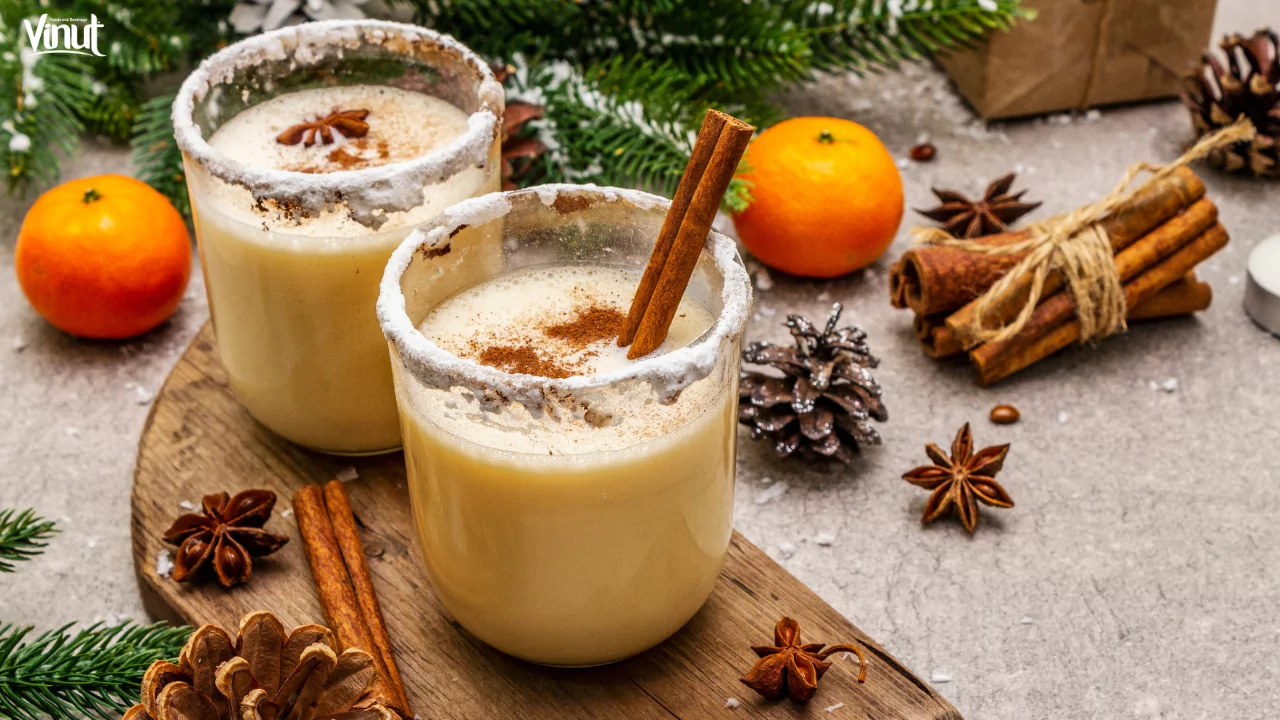Eggnog: Discover the Secrets for Christmas Holiday

Summary
Eggnog is a beloved holiday beverage that has captivated taste buds for centuries. This creamy concoction, often spiced with nutmeg and laced with alcohol, evokes cozy memories around the fire and joyous celebrations with family and friends.
As we delve into the rich history of eggnog, explore authentic recipes, and offer customization tips, you'll gain a deeper appreciation for this festive drink. Let’s embark on a journey through the eggy wonders of eggnog.
The Rich History of Eggnog
Early Beginnings and Origins
The roots of eggnog can be traced back to medieval Europe, where early versions of the drink were often called "possets." Possets were warm milk beverages mixed with ale or wine, enjoyed by the upper class as a source of comfort and indulgence.

As the drink evolved, eggs, which symbolized fertility and renewal, found their way into the mix. The addition of eggs was likely inspired by the English elite who sought richer flavors and textures in their beverages. By the 17th century, the name "eggnog" began to surface, derived from the combination of "egg" and the term "nog," a slang word for strong ale.
Interestingly, eggnog made its way to America during colonial times, where it quickly gained popularity among settlers. The availability of fresh eggs, cream, and rum provided the perfect base for the drink to flourish, leading to distinctive variations across different regions.
How to Make Authentic Eggnog at Home?
Traditional Ingredients Needed
To make authentic eggnog, you will need a handful of essential ingredients that blend to create a rich and smooth beverage. Here are the basics:

- Eggs: Fresh eggs are essential for achieving that signature creaminess and richness in flavor.
- Sugar: Granulated sugar adds sweetness to balance the richness of the eggs and cream.
- Milk and Cream: Whole milk and heavy cream combine to provide a luxurious texture, allowing the drink to achieve that iconic creamy consistency.
- Alcohol (optional): Traditional recipes often incorporate rum, bourbon, or brandy for a warming kick. If you prefer a non-alcoholic version, simply omit this ingredient.
- Spices: Nutmeg and cinnamon are classic spices that elevate the flavors of eggnog, adding warmth and aromatic depth.
Step-by-Step Instructions
Making eggnog from scratch involves a few simple steps, but the results are well worth the effort. Here’s how to do it:

- Separate the Eggs: Begin by separating the yolks from the whites. Place the yolks in one bowl and the whites in another.
- Beat the Egg Yolks: Using a whisk or electric mixer, beat the egg yolks until they turn pale yellow and frothy. Gradually add the granulated sugar while continuing to whisk until the mixture becomes thick and creamy.
- Combine with Milk and Cream: Slowly stir in the milk and heavy cream until fully blended.
- Add Spices and Alcohol: Sprinkle in freshly grated nutmeg and cinnamon, adjusting the amounts to suit your taste preferences. If desired, pour in the alcohol and mix well.
- Whip the Egg Whites: In a separate bowl, beat the egg whites until soft peaks form. Gently fold the whipped egg whites into the eggnog mixture for added lightness and volume.
- Chill and Serve: Refrigerate the eggnog for a few hours to allow the flavors to meld. When ready to serve, give it a gentle stir and pour into glasses. Top with additional nutmeg or cinnamon for garnish.
Tips for Customizing Your Eggnog
While traditional recipes are always a hit, there’s no harm in getting creative with your eggnog! Here are some ideas for customizing your beverage:

- Flavored Spirits: Experiment with flavored liqueurs like hazelnut, chocolate, or vanilla to add unique twists to your eggnog.
- Alternative Milk: For those with dietary restrictions, consider substituting regular milk and cream with almond milk, coconut milk, or oat milk for a vegan-friendly option.
- Add Fruit: Infuse your eggnog with seasonal fruits such as cranberries or orange zest for a refreshing burst of flavor.
- Spice Variations: Beyond the classic nutmeg and cinnamon, feel free to play with other spices like cardamom, ginger, or even peppermint extract for a festive touch.
Frequently Asked Questions
Can eggnog be made non-alcoholic?
Absolutely! One of the great features of eggnog is its versatility. To craft a delicious non-alcoholic version, simply skip adding any spirits and focus on blending the core ingredients: eggs, sugar, milk, cream, and spices.
You can also enhance the flavor profile by incorporating extracts like vanilla or almond for that extra layer of richness. Many families have adopted non-alcoholic eggnog for their younger members or those who prefer to abstain, ensuring everyone can join in on the festive fun.
How long can homemade eggnog last?
Homemade eggnog can typically be stored in the refrigerator for up to three to five days. However, it’s essential to keep it well-sealed in an airtight container to maintain its freshness. Given the presence of raw eggs, it's important to be cautious when consuming eggnog after a few days.
If you’re looking to extend its shelf life, consider freezing the eggnog. While the texture might change slightly upon thawing, the flavors will still remain enjoyable. Just be sure to give it a good stir before serving.
What are some popular variations of eggnog?
Eggnog has inspired countless variations over the years, reflecting personal touches and regional preferences. Some popular variations include:
- Pumpkin Eggnog: Infused with pumpkin puree and spices, this variation captures the flavors of fall, making it a delightful autumn twist.
- Chocolate Eggnog: Adding cocoa powder or chocolate syrup creates a decadent chocolatey version, perfect for those with a sweet tooth.
- Vegan Eggnog: Utilizing plant-based milks such as almond or coconut milk along with aquafaba (chickpea brine) for whipped egg whites creates a delicious vegan alternative.
Each variation offers a new experience, allowing eggnog enthusiasts to explore different flavor profiles and find their favorite rendition.
